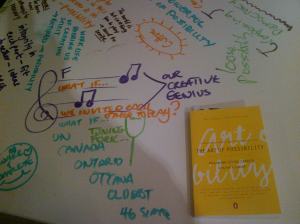More transparency in business practice has been the buzz for a while now. Counted among its benefits are increased employee morale, better client service, increased productivity and enhanced creativity. What’s more, it models best practices and opens the organization to opportunity and innovation. So if transparency is so good, why do most businesses have such a hard time being transparent?
Do you remember the phrase, “knowledge is power”? Well most of us believe that to be true. If you couple that thinking, with a belief that resources are scarce, then hoarding power or knowledge makes a lot of sense. If that’s your world view, it’s not hard to see how the idea of transparency might be difficult to adopt. After all, if I’m doing something good in my business, then my competitors might steal my ideas. If I’m doing something badly, then my competitors can use it against me. If we are operating under those principles, then we are incapable of being open and transparent.
The thing is, why do we think knowledge is scarce? What happens if by being transparent our challenges get resolved or solutions come from unexpected sources? What if knowledge shared is in reality, knowledge squared? The evidence is that far from being scarce, we have an abundance of knowledge. Don Tapscott, a Canadian business executive, author, consultant and speaker, specializing in business strategy and organizational transformation argues that far from being scarce we have never had so much access to knowledge. He looks at the internet as a worldwide computer that is constantly being programmed by all of us as we upload videos, documents and ideas. In a world full of knowledge, transparency isn’t a just a novel new idea, it is how businesses will survive and renew.
They say that a rising tide lifts all boats. We see the evidence of that in the blogging community on a regular basis. When we share, our time, our ideas, our expertise in the form of posts, comments and advice, we make the community stronger and more effective. We do something else too. We make better content for our readers and we provide better ideas to those freelancers, entrepreneurs and businesses who stop by our blogs looking for answers. If our blogs are part of our business, we provide reassurance about our knowledge. We let our clients know that we can be trusted because we put the spotlight on our thoughts and our thinking processes. How better to build brand trust than to demonstrate what we think and what we value? Operating with transparency really does illuminate values in a way that no mission statement, vision or strategic plan can.
If we turn to science in search of why this is true, we find that our brains are optimized for performance when we no longer feel the need to hide our mistakes or worry about blunders. Neuroscience tells us that we are healthier when we are not burdened by secrets. Anita Kelly, a psychologist at Notre Dame who studies the psychology of secrets puts it simply, “I don’t think it’s much of a stretch to say that being secretive could be linked to being symptomatic at a biological level.”
For the sake of clarity, the science does not encourage us to share every secret we’ve ever held in an effort to get healthy, but does reveal that people who are secretive tend to be more depressed, anxious, shy, and have more aches and pains.
It would seem that the benefits of transparency are clear. On that note, I’d like to extend my thanks to Jon Jefferson for prompting me to explore the issue of transparency in my blog. So what do you think? Should we adopt radical transparency in our workplaces and bear all from salaries to goals, objectives and ideas? Or do you think a little more modesty is in order?
Related Articles:
- The Science Behind Secrets (Observer)
- Don Tapscott: Four principles for the open world (TED)
- Why Radical transparency Is Good Business (HBR Blog Network)

